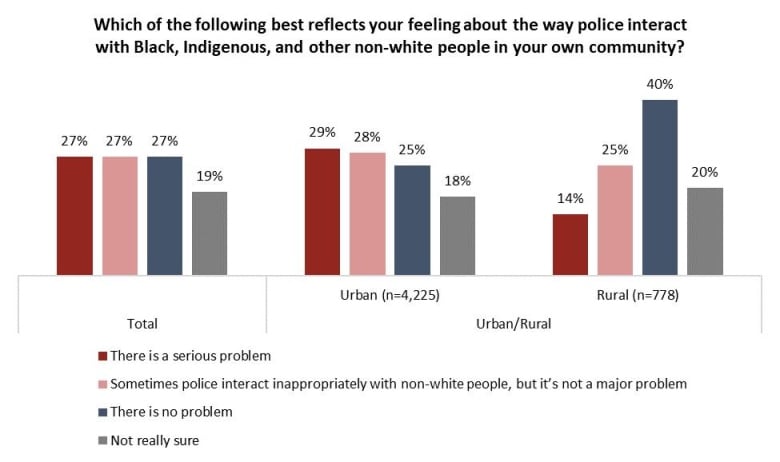The Angus Reid survey found nearly two-thirds of participants agree systemic racism is a serious problem, and almost three-quarters say police in Canada interact inappropriately with Black, Indigenous and people of colour at least some of the time.

Nearly two in five Canadians believe there is a serious problem with the way police forces interact with Black, Indigenous and people of colour (BIPOC) communities across the country, according to a new poll.
The Angus Reid survey Defend or Defund?, which polled 5,005 adult Canadians, also found that nearly two-thirds (63 per cent) agree systemic racism is a serious problem, and almost three-quarters (73 per cent) say police in Canada interact inappropriately with Black, Indigenous and people of colour at least some of the time.
When Canadians were asked which answer reflects their feelings about how police interact with non-white people on a national level, the results showed:
- 39 per cent felt there was a serious problem.
- 34 per cent said it was sometimes a problem.
- 15 per cent said there was no problem.
- 12 per cent weren’t sure.
But fewer Canadians see the way police treat non-white people in their province as a serious problem, and the number drops again when asked about their own communities.
When Canadians were asked the same question about community policing, the results showed:
- 27 per cent felt there was a serious problem.
- 27 per cent said it was sometimes a problem.
- 27 per cent said there was no problem.
- 19 per cent weren’t sure.

Urban vs. rural
The survey found there is a clear divide on the issue based on whether someone lives in an urban or rural area.
Those outside of major cities were half as likely to say there was a serious problem with how police interact with Canadians of colour in their communities: Almost 30 per cent of urban respondents believe there is a serious problem, while only 14 per cent of rural respondents feel that way. Two in five of those polled in rural areas don’t see a problem at all.
Breaking down the results between major urban centres in Canada, the survey showed a greater proportion of residents in the Greater Toronto Area were concerned about police interaction with non-white people than in western cities.
- In the GTA, 41 per cent said it’s a serious problem;
- In Winnipeg, 36 per cent;
- In Montreal, 35 per cent;
- In Vancouver, 29 per cent;
- In Edmonton, 24 per cent;
- In Calgary, 23 per cent.

Topical issues within policing
The poll also explored viewpoints on several topical policing issues in Canada, including systemic racism, use of force and police funding.
It found that 28 per cent of Canadians agree there is systemic racism within the RCMP, specifically. And 27 per cent of Canadians said that police are too quick to use force to solve a problem.
Amid national and international outcry over violence and death at the hands of the police, there have been calls to defund the police. In the poll, 25 per cent of Canadians agree there is too much funding going to police forces and that it should be reduced. The survey found 38 per cent of Canadians believed funding levels were just right.
The online poll was conducted from Aug. 26 to Sept. 1, 2020, and carries +/- 1.5 percentage points margin of error 19 times out of 20.
